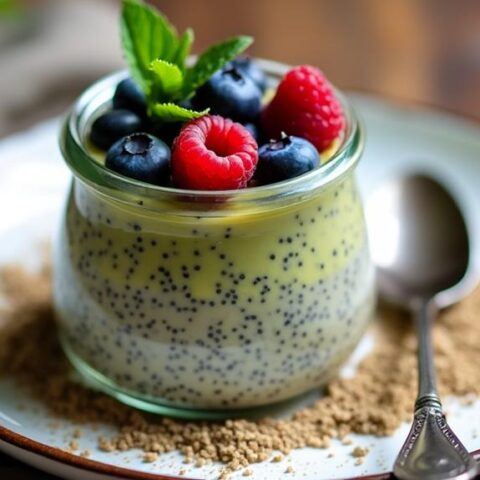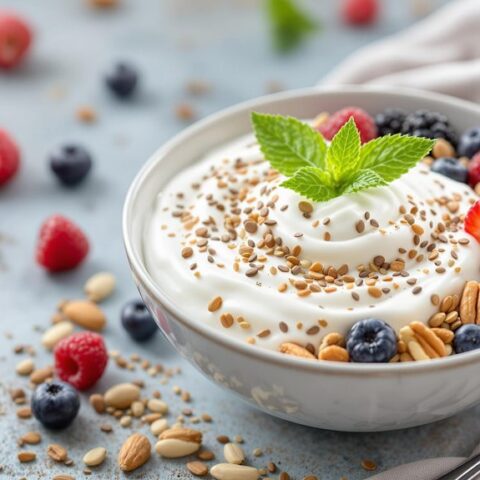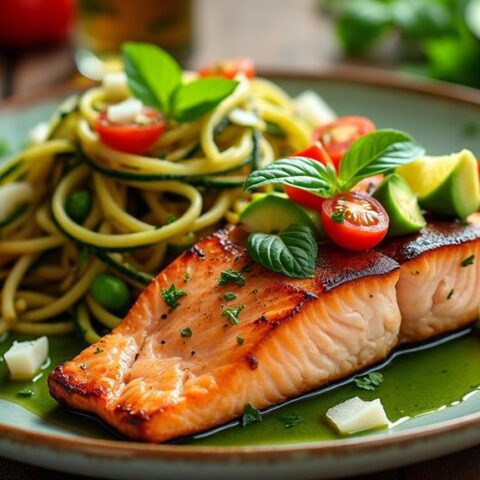
Oysters are indeed a low-carb seafood choice, containing only 4.95 grams of net carbs per 100 grams while offering substantial nutritional benefits. With a glycemic index of zero, they're ideal for ketogenic diets and those managing blood sugar levels. Each serving provides 9.45 grams of protein, along with essential nutrients like zinc and iron. Raw, grilled, or in low-carb stews, oysters offer versatile preparation options that maintain their nutritional profile. Exploring their full range of preparation methods reveals even more benefits.
Key Takeaways
- Oysters contain 4.95 grams of net carbs per 100 grams, making them suitable for low-carb and ketogenic diets.
- With a glycemic index of zero, oysters maintain stable blood sugar levels and support insulin sensitivity.
- A typical three-ounce serving provides 4.2 grams of carbohydrates while delivering 9.45 grams of protein.
- Oysters can be prepared in keto-friendly ways, such as grilling with herb butter or making low-carb stews.
- Compared to other shellfish options, oysters have moderate carb content, with shrimp and mussels offering lower-carb alternatives.
Understanding Oyster Carbohydrate Content
Seafood enthusiasts following low-carb diets will find oysters to be an excellent dietary choice, as these marine delicacies contain remarkably few carbohydrates. With approximately 4.95 grams of net carbs per 100 grams, oysters align perfectly with ketogenic diet requirements while delivering essential nutrients. A typical serving of oysters, consisting of three ounces, contains just 4.2 grams of total carbohydrates, making them an ideal option for those monitoring their carb intake. Their glycemic index of zero guarantees stable blood sugar levels, while their carbohydrate content remains low enough to maintain ketosis. For individuals with Type 2 diabetes, the keto diet's emphasis on low-carb intake can improve insulin sensitivity, making oysters a tasty and beneficial option. For individuals following strict low-carb regimens, oysters provide a satisfying meal option that helps maintain dietary compliance without compromising nutritional goals or taste preferences.
Nutritional Breakdown of Oysters
A thorough nutritional analysis reveals that oysters deliver an impressive array of nutrients while maintaining minimal carbohydrate content.
Being low in carbs at just 4.95 grams per 100-gram serving, oysters contain a balanced mix of essential nutrients that support overall health.
- As a quality source of protein with 9.45 grams per serving, oysters help maintain muscle mass while offering a healthy fat profile.
- Their high zinc content and rich in vitamins makeup, particularly 16.62 mg of zinc per serving, supports immune function.
- With 5.11 mg of iron per serving, oysters can help prevent iron deficiency anemia while maintaining a low glycemic index of zero.
These nutritional attributes make oysters an excellent choice for those seeking nutrient-dense, low-carb food options.
Health Benefits and Keto Compatibility
When considering their compatibility with ketogenic and low-carb dietary protocols, oysters stand out as an exceptional choice due to their minimal carbohydrate content and rich nutritional profile. Their impressive protein content of 9.45 grams per 100-gram serving supports muscle maintenance while promoting satiety on a keto diet.
The health benefits of oysters extend beyond their macronutrient composition. These shellfish are packed with essential nutrients, particularly zinc and vitamin B12, which support immune function and overall wellness.
Their omega-3 fatty acids contribute to cardiovascular health and help reduce inflammation, making them an excellent addition to a low-carb lifestyle. With high nutrient density and minimal calories, oysters provide substantial nutritional value while allowing individuals to maintain their desired carbohydrate restrictions on a keto diet. Adding oysters to your diet can also assist in enhanced insulin sensitivity, which is crucial for managing Type 2 diabetes and stabilizing insulin mechanisms.
Best Ways to Prepare Low-Carb Oyster Dishes
Preparing delicious low-carb oyster dishes requires careful attention to ingredients and cooking methods that complement their natural flavors while maintaining minimal carbohydrate content. As a rich source of various nutrients and an excellent source of protein, oysters can be prepared in multiple ways that align with low-carb diets.
- Grilled oysters on the half shell, topped with herb-infused butter and a splash of lemon, provide a smoky depth while remaining carb-conscious.
- Low-carb oyster stew made with heavy cream, packed with essential nutrients and warming comfort.
- Fresh seafood salads featuring raw oysters, combined with crisp greens and high-fat dressings.
These recipes that call for simple, keto-friendly ingredients enhance the oysters' natural taste while keeping carbohydrates to a minimum, making them perfect for health-conscious diners. A ketogenic diet greatly reduces blood glucose levels, which can be beneficial for those managing type 2 diabetes.
Smart Portion Control for Keto Dieters
Successful keto dieting with oysters depends heavily on understanding and implementing proper portion control measures. For those following a low-carb lifestyle, tracking portion sizes is essential, as oysters contain 4.95g of net carbs per 100g serving. The recommended serving size is three ounces, equivalent to two or three medium oysters, which helps maintain ketosis while enjoying this nutritious seafood. To effectively monitor intake, maintaining a food diary or using a mobile tracking app can help keto dieters stay within their daily carb limits. Smart portion control can be enhanced by combining oysters with complementary low-carb ingredients, such as healthy fats and leafy greens, creating satisfying meals that align with ketogenic guidelines while maximizing nutritional benefits. Reading nutrition labels accurately ensures that oysters fit into your daily carb allotment while also verifying the absence of hidden sugars or high-carb fillers.
Alternative Shellfish Options for Low-Carb Diets
For those seeking variety in their low-carb lifestyle, several shellfish alternatives to oysters offer comparable nutritional benefits while maintaining minimal carbohydrate content.
These options provide essential nutrients while adhering to strict dietary guidelines, making them excellent choices for health-conscious individuals.
Following nutritional guidelines doesn't mean sacrificing essential nutrients – these alternatives deliver optimal health benefits while meeting strict dietary requirements.
- Shrimp leads the pack with only 1 gram of net carbs per 100 grams.
- Mussels contain 3 grams of net carbs per 100 grams, offering a protein-rich alternative.
- Clams and scallops both provide 5 grams of net carbs per 100 grams.
Including omega-3 fatty acids from seafood like shrimp and mussels can enhance heart health while supporting low-carb diet requirements.
These shellfish alternatives not only support low-carb diet requirements but also deliver important nutrients necessary for peak health.
Whether incorporating shrimp, mussels, clams, or scallops, these options guarantee menu variety while maintaining ketogenic and low-carb dietary goals.
Frequently Asked Questions
Can You Eat Oysters on a Low Carb Diet?
Oysters are excellent low-carb seafood choices, containing minimal carbohydrates and high protein content. Their nutrition profile supports various cooking methods while offering health advantages for those following carb-restricted dietary plans.
Are Oysters High in Carbohydrates?
Oyster nutritional profiles show low carbohydrate content, with only 4.95 grams per 100-gram serving. Various oyster varieties maintain consistent carb levels regardless of cooking methods, making them suitable for low-carb dietary guidelines.
Which Seafood Has the Lowest Carbs?
Among seafood types, shrimp contains the lowest carb content at 0.2 grams per 100 grams, followed by tuna and salmon with less than 1 gram, offering excellent nutritional benefits for low-carb meal planning.
What Is the Best Seafood for Keto Diet?
Salmon stands out as ideal keto seafood, offering healthy fats and protein sources. Other excellent choices include tuna and oysters, delivering nutritional benefits while adhering to keto guidelines for low carb meal prep.
Conclusion
Oysters stand out as an excellent choice for low-carb and ketogenic diets, offering minimal carbohydrates while delivering impressive nutritional benefits. With proper portion control and preparation methods, these shellfish can become a regular part of a health-conscious eating plan. Whether enjoyed raw, steamed, or baked with keto-friendly toppings, oysters provide a versatile option for those seeking to maintain their low-carb lifestyle without sacrificing flavor or nutritional value.










No Comments